Teaching the Plan of Salvation is always fun for me. I love seeing children, youth, or adults make the connections about life, where we came from, and where we are going. Here is my favorite way to teach the Plan of Salvation. I have taught it in seminary and to other youth. It is a wonderful way for them to remember what Dieter F. Uchtdorf taught:
“Love is what inspired our Heavenly Father to create our spirits; it is what led our Savior to the Garden of Gethsemane to make Himself a ransom for our sins. Love is the grand motive of the plan of salvation; it is the source of happiness, the ever-renewing spring of healing, the precious fountain of hope.” (Dieter F. Uchtdorf, You Are My Hands, April 2010 General Conference)
First, you will give each person a paper and pencil and ask them to follow your instructions. Use the instructions to have the youth try and draw the following diagram. Don’t tell them before hand what they are doing or what it is supposed to look like.
Draw a small circle
Label it “Pre-mortal life”
Draw a line down from that circle
Label it “Veil of Forgetfulness”
Draw a short line to the right from that line
Label it “Birth”
Draw a large circle and make it the earth
Label it “Mortal Life”
Draw a short line from the circle and make a small circle
Label this circle “Death”
From the death circle, draw two angled lines
Label one “Paradise” and one “Spirit Prison”
From the death circle, draw a line to the right
Label this “Resurrection”
Draw a tall line up from this line
Label this line “Judgement”
Draw three lines coming off the tall line
Label them “Celestial,” “Terrestrial,” and “Telestial”
Show the youth the official illustration and ask if theirs looks like that.
I usually have it drawn out on a butcher paper and rolled across the floor so we can get interactive with the next part of the lesson. You could also hang it on the wall if you have a place for it. Here are a few pictures of what some of the drawings looked like from following the instructions above.
This can lead the discussion into if they had known ahead of time what it was supposed to look like or at least spell it would have helped them. That’s why learning about the Plan of Salvation is so important! It gives us an overview of what God’s plan is for His children and helps them.
Read John 3:16, “For God so loved the world, that he gave his only begotten Son, that whosoever believeth in him should not perish, but have everlasting life.”
Point to the Plan of Salvation again. Have someone read Elder Uchtdorf’s quote, “Love is what inspired our Heavenly Father to create our spirits; it is what led our Savior to the Garden of Gethsemane to make Himself a ransom for our sins. Love is the grand motive of the plan of salvation; it is the source of happiness, the ever-renewing spring of healing, the precious fountain of hope.” (Dieter F. Uchtdorf, You Are My Hands, April 2010 General Conference)
At this point in the lesson I divide the class up into smaller groups and give them envelopes that contain scriptures and quotes from The Living Christ. The group reads what is in their envelopes and decides what role Jesus Christ played and where in the Plan of Salvation He performed that role. As the groups are doing this I place pictures of Jesus Christ in the various roles around the giant LOVE Plan of Salvation on the floor. The groups then find the picture or pictures that go with their scriptures and quotes. We start at the beginning with Pre-mortal Life and work our way through the Plan of Salvation with each group coming to the front of the class to teach their portion of Christ’s role in that part of the Plan of Salvation.
I’ve included all the quotes and scriptures for each part of the Plan of Salvation in the download below as well as the drawing instructions. You will find links to the pictures I used at the bottom of the post. Because of copyrights I did not collect them all to download together.
Links to pictures:
Pre-mortal Life (Council in Heaven)
Jesus Christ and the Council in Heaven, artist unknown
Pre-mortal Life (Creation)
Jehovah Creates the Earth (Jesus Christ Creates the Earth and the Heavens), by Walter Rane
Mortal Life
Sermon on the Mount, by Harry Anderson
Christ Healing a Blind Man, by Del Parson
Jesus Blessing Jairus’s Daughter (Christ Raising the Daughter of Jairus), by Greg K. Olsen
Mortal Life (Gethsemane, Crucifixion, Death)
Jesus Praying in Gethsemane (Christ in Gethsemane), by Harry Anderson
The Crucifixion of Christ, artist unknown
Burial of Jesus (The Burial of Christ), by Carl Heinrich Bloch
Spirit World
Resurrection
Mary and the Resurrected Lord, by Harry Anderson
Jesus Shows His Wounds (Behold My Hands and Feet), by Harry Anderson
A detail from Jesus Christ Visits the Americas, by John Scott
Judgement
The Last Judgment, Washington D.C. Temple mural by John Scott
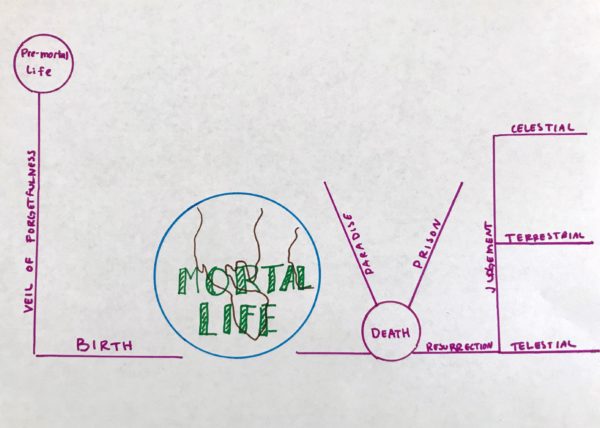
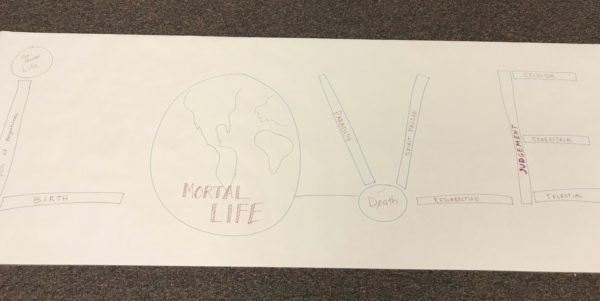
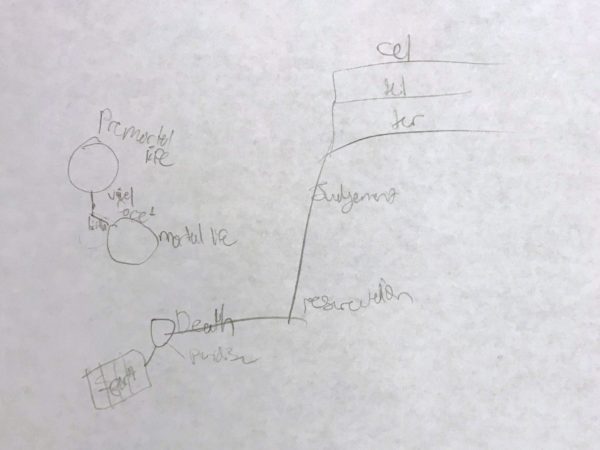
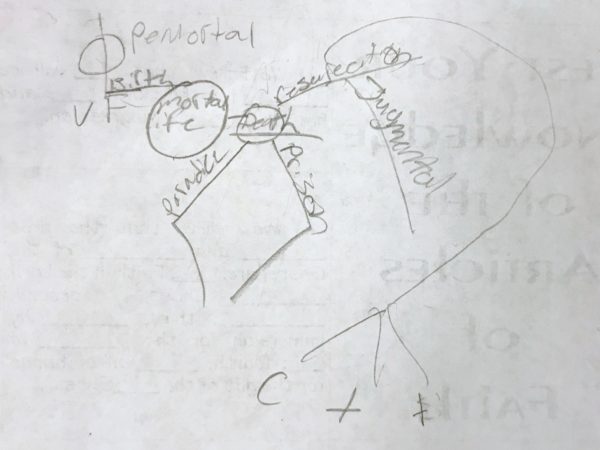
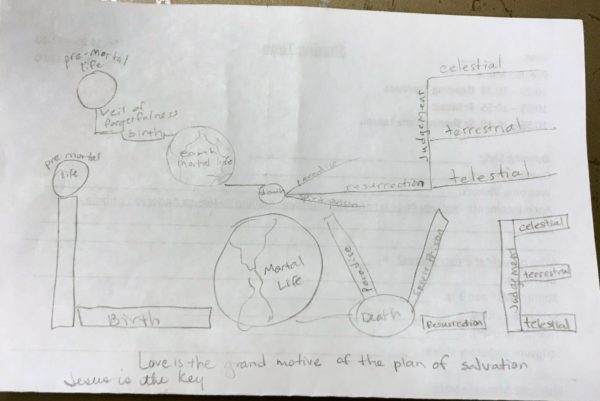

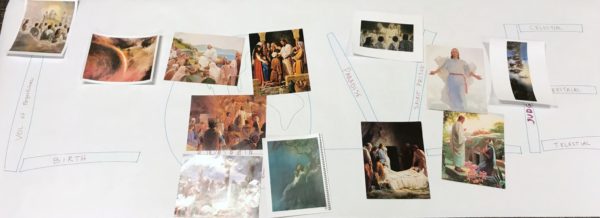
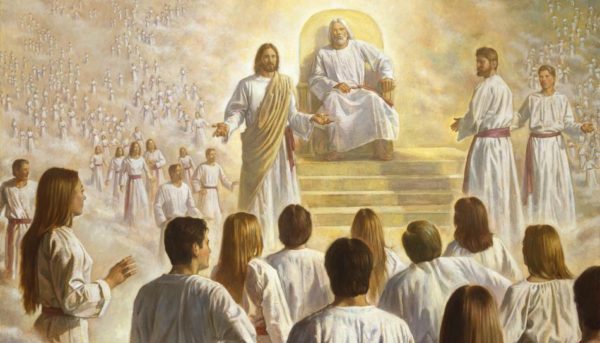


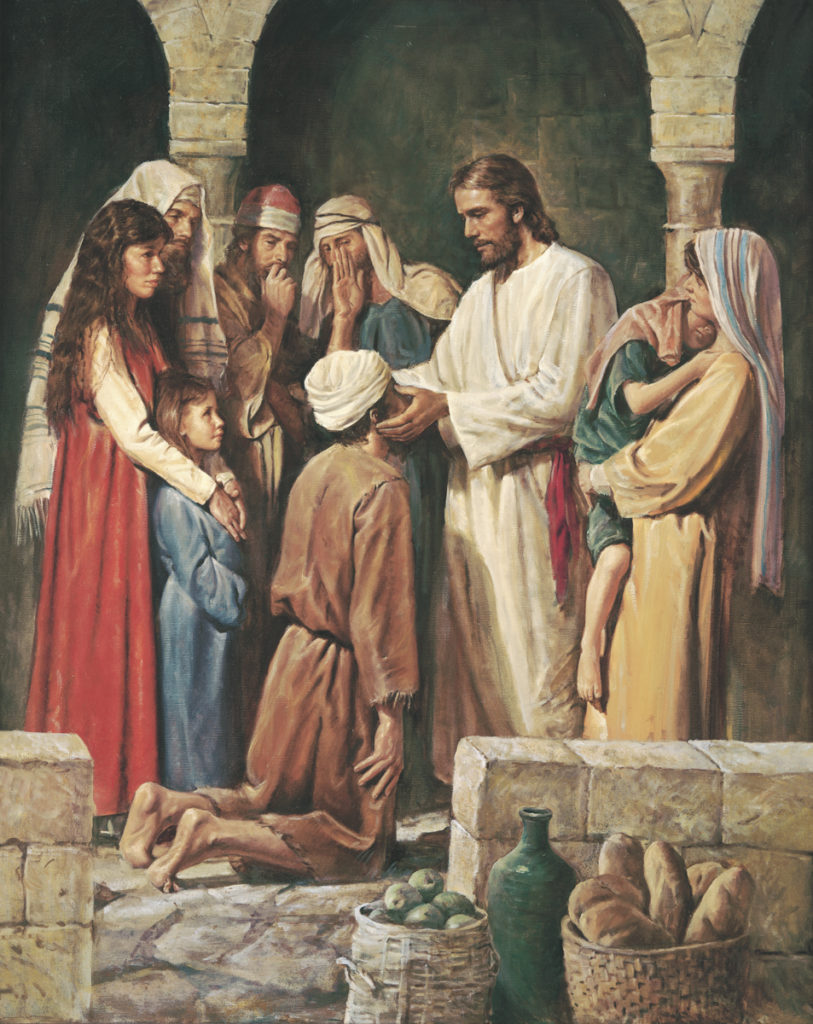


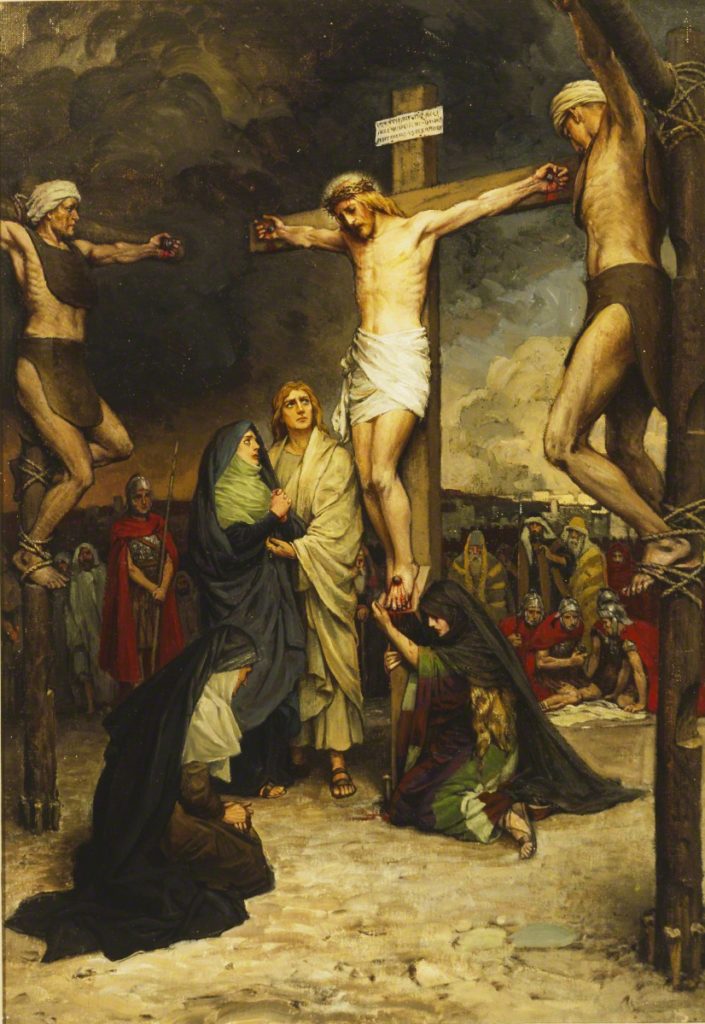
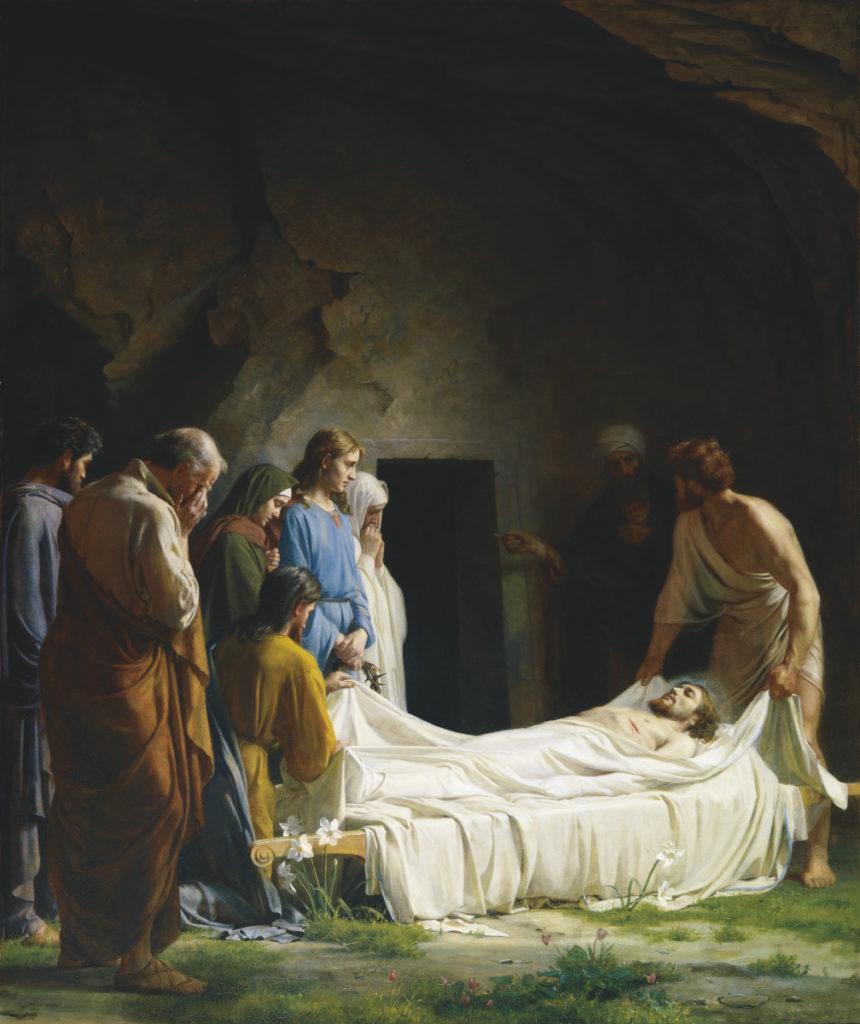


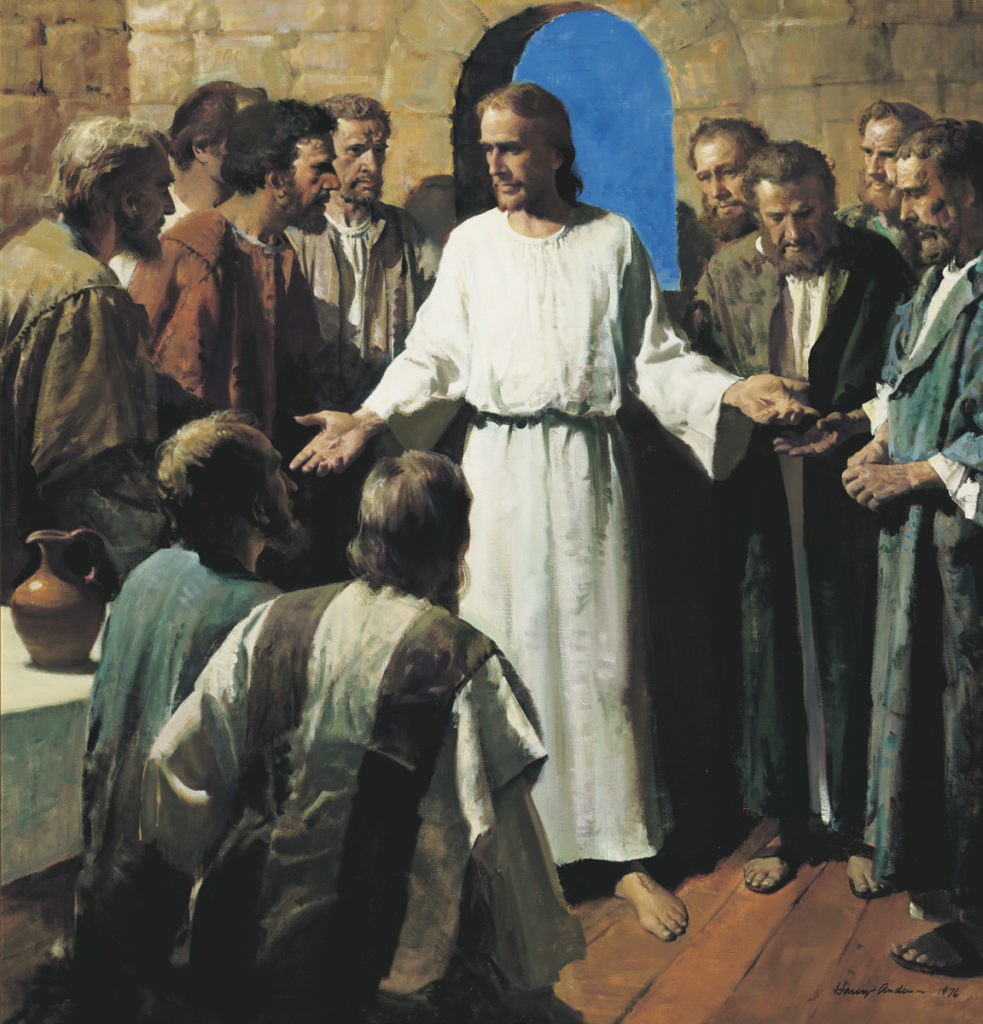
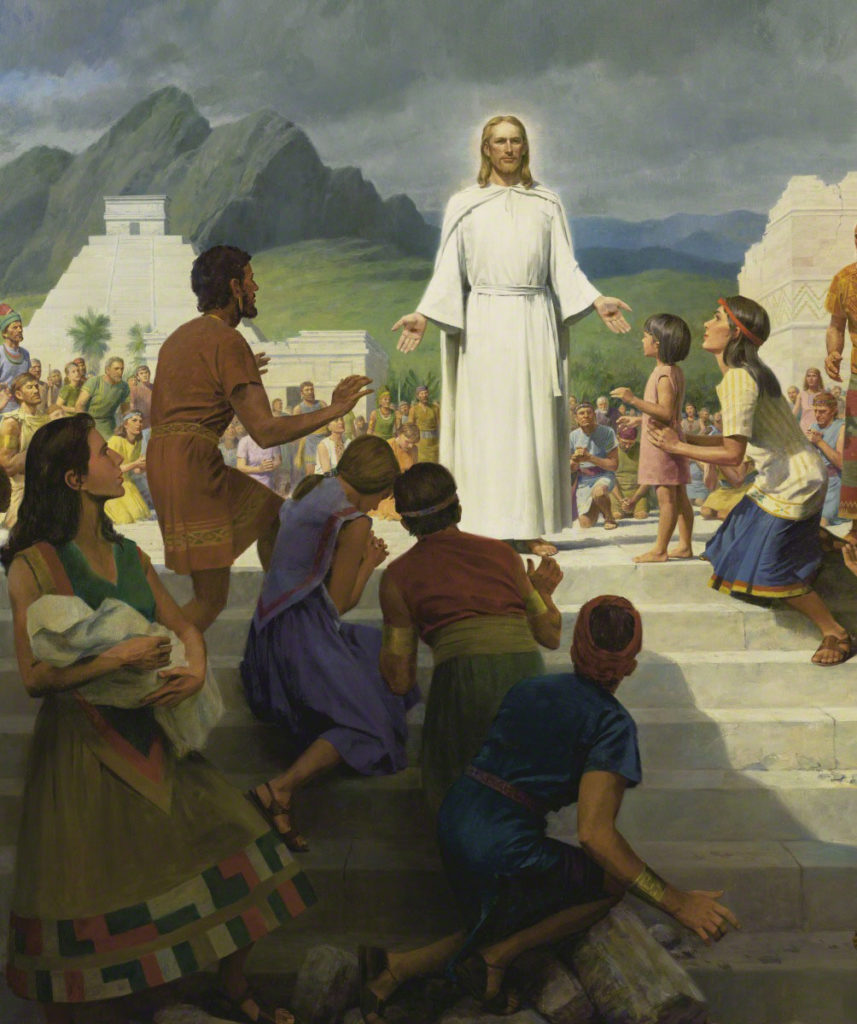

I have been studing the plan of salvation but find myself very troubled by it.
In Matthew 5:48 we read “Be ye therefore perfect, even as your Father which is in heaven is perfect.” a similar verse is found in 3 Nephi 12:48. The problem is that the “Be ye ” is in the present tense, it is not the same as saying to become perfect. If your boss says to be on time, he doesn’t mean to work on it over the next year or so. He want it immediately. So how can God possibly see me as perfect right here and now?
I also read in James 2:10 that if you fail at only one point you have broken the entire law again this is found in the D&C 82:7 which states that if you repent of a sin and commit it again later, then all of your pervious sins will return. Furthermore Isaiah 64 v 6 says that all our righteous acts are like filthy rags in God’s sight and Romans 3 v 20 says that “no-one will be declared righteous by observing the law” because “all have sinned and come short of the glory of God”. So how can I be declared righteous in God’s sight?
You’re right! We can’t be perfect now, our sins and our attempts at righteousness are “filthy rags” in God’s sight, we constantly fall SO short of the Glory of God that our situation is hopeless. Without Christ. Only WITH Christ can we be perfect, whole, and right before God, even today. I like the example of a bank account. It doesn’t matter how miserably overdrawn I am if I merge my account with a bazillionaire my account is suddenly back in the black. Certainly the scriptures you quoted remind us how overdrawn our account with God is. But when we merge accounts with Christ we are suddenly back in the black and right before God. It is staggeringly humbling, right? How good He is to us!
In normal circumstances we can’t just merge accounts with a bazillionaire, so how can we expect to just merge bank account with Christ especially if I need to be perfect right now for that to happen
My account is in the red with God and I have to give an account of all my sins to him,
2 Corinthians 5:10
10 For we must all appear before the judgment seat of Christ; that every one may receive the things done in his body, according to that he hath done, whether it be good or bad.
and the consequences are
Romans 6 v 23
The wages of sin is death
It is completely impossible to atain anything close to perfection, yet from my reading God demands that of us right here and now
Isobel, I think how you are defining “perfect” as you are reading it in Matthew 5:48, “Be ye therefore perfect, even as your Father which is in heaven is perfect.” is not the same definition of “perfect” that it was translated from in the Greek text. If you look at Strong’s Concordance of the the Bible you find that “perfect” in this verse is translated from the Greek ‘teleios’ which does not mean “without flaw” but rather completeness, wholeness. See here: https://www.blueletterbible.org/lang/Lexicon/Lexicon.cfm?strongs=G5046&t=KJV
Our church leaders have taught us numerous times about this verse. Here are a couple of my favorite talks that would explain much better than I can.
Perfection Pending by President Russell M. Nelson (who is now our prophet): https://www.lds.org/general-conference/1995/10/perfection-pending?lang=eng&_r=1
Be Ye Therefore Perfect – Eventually by Elder Jeffrey R. Holland: https://www.lds.org/general-conference/2017/10/be-ye-therefore-perfect-eventually?lang=eng
It is through the grace of Jesus Christ, His Atonement, that we are able to eventually overcome our imperfections, which is why I like to teach the plan of salvation as shown in the post. We can be honest and virtuous and be full of integrity right now as defined by the Greek ‘teleios’. In that way we CAN fulfill the commandment to be “perfect.”
“Yea, come unto Christ, and be perfected in him, and deny yourselves of all ungodliness; and if ye shall deny yourselves of all ungodliness, and love God with all your might, mind and strength, then is his grace sufficient for you, that BY HIS GRACE ye may be perfect in Christ.” Moroni 10:32 (keep reading vs 33 too)
The Atonement of Christ is the answer.
To merge accounts with Christ we owe Him: coming unto Him, denying ourselves of ungodliness, and loving him with all our hearts, minds and strength.
And merging bank accounts isn’t that hard either. When I married my husband and I merged our accounts, only in that case I was the “bazillionaire” (I had $400, ha!).
I hope the Moroni verses help you find clarity in your search. If we are left to become perfect on our own then we are ALL lost and God’s plan would be frustrated. He wouldn’t have created this earth for us if it meant that we would all be unavoidably lost.
Surely “wanting nothing to completeness” is perfection, it wants nothing to be complete therefore – perfect.
2 NEPHI 25:23: “For we labor diligently to write, to persuade our children, and also our brethren, to believe in Christ, and to be reconciled to God; for we know that it is by grace that we are saved, after all we can do.”
The question you and I have to ask is have I done “all” I can do for salvation? Isn’t there always something else you can think of that you haven’t done for salvation? At what point have you done enough to be sure that you will be saved?
2.) ALMA 5:27-31: “Have ye walked, keeping yourselves blameless before God? Could ye say, if ye were called to die at this time, within yourselves, that ye have been sufficiently humble? That your garments have been cleansed and made white through the blood of Christ, who will come to redeem his people from their sins? Behold, are ye stripped of pride? I say unto you, if ye are not ye are not prepared to meet God. Behold ye must prepare quickly; for the kingdom of heaven is soon at hand, and such an one hath not eternlife. Behold, I say, is there one among you who is not stripped of envy? I say unto you that such an one is not prepared; and I would that he should prepare quickly, for the hour is close at hand, and he knoweth not when the time shall come; for such an one is not found guiltless. And again I say unto you, is there one among you that doth make a mock of his brother, or that heapeth upon him persecutions? Wo unto such an one, for he is not prepared, and the time is at hand that he must repent or he cannot be saved!”
I cannot say that I have walked blameless before God? Are you sufficiently humble, stripped of pride and envy? Would it be honest to admit that you have not done “all” you can do for salvation and that you are “not prepared to meet God”? If you were to die tonight, would you be sure that you have “eternal life”?
Remember trying is not sufficient. Either you are “prepared to meet God” or you are not prepared. Either you are “stripped” of envy and pride and have repented of all of your sins and are thus walking “blameless before God” (without sin), or you are not blameless. There is no middle ground. Spencer W. Kimball explained it this way: “There is one crucial test of repentance. This is abandonment of the sin. …The saving power does not extend to him who merely wants to change his life. …Nor is repentance complete when one merely tries to abandon sin. …To ‘try’ is weak. To ‘do the best I can’ is not strong. We must always do better than we can.” —The Miracle of Forgiveness, pp. 163-165
That verse is part of the problem. Can I really say that I have denied myself of “all ungodliness”? Can you truly say that? Since Jesus’ grace is not sufficient for me until me have cleared “all ungodliness” out of my life, how can I be “perfect in Christ”? How can any of us? How can we receive His “grace” for salvation, if we haven’t stopped sinning and are not walking “blameless before God,” being sufficiently humble, stripped of pride and envy? Can you honestly say you have done “all” you can do for salvation? I don’t think anyone can say that they have done “all” because there is always more that you could have done. Isn’t there? Do you notice that it is only “then” that his grace is sufficient for us.